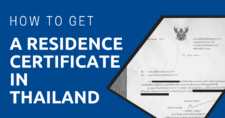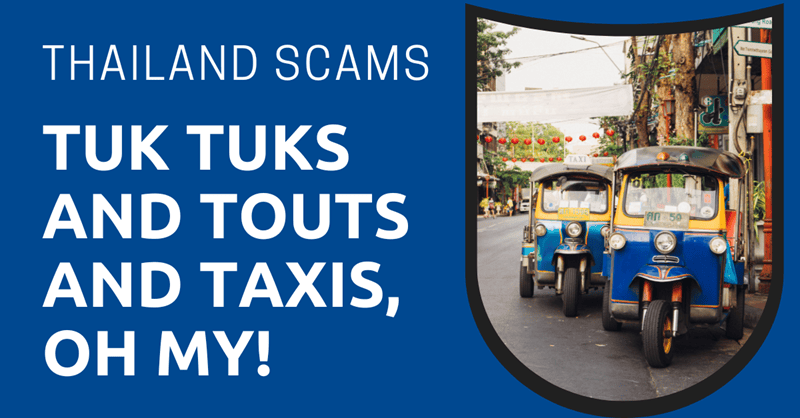
I love Thailand. It is my chosen adoptive home for so many reasons. I adore the people, the culture, the food, the scenery, and the dream vacation destinations. But I also recognise that – just like anywhere in the world – opportunistic people will try to scam others out of a bit of cash.
Thailand is no exception, and frequently the victims of the scams are clueless tourists – or those who fit the aesthetic of clueless tourists, ie: farangs of the pale variety and pretty much anyone else who looks foreign.
These exploitative tourism practices and scams can turn a good time into a nightmare so here are some to keep in the back of your mind when you are doing clueless tourist stuff.
Got a story? Tell me about the time you were scammed or ripped off in Thailand in the comments!
"*" indicates required fields
Disclaimer: This article may include links to products or services offered by ExpatDen’s partners, which give us commissions when you click on them. Although this may influence how they appear in the text, we only recommend solutions that we would use in your situation. Read more in our Advertising Disclosure.
Contents
Tuk Tuks
Ah Bangkok tuk tuks. It is a love/hate relationship. They look so cool with their neon colors, lights, and the sound of Butterfly by Crazy Town pumping from the speakers. Even us jaded old expats occasionally get a thrill out of a late night drunken dash between bars in the back of a Thai tuk tuk loaded up with friends.
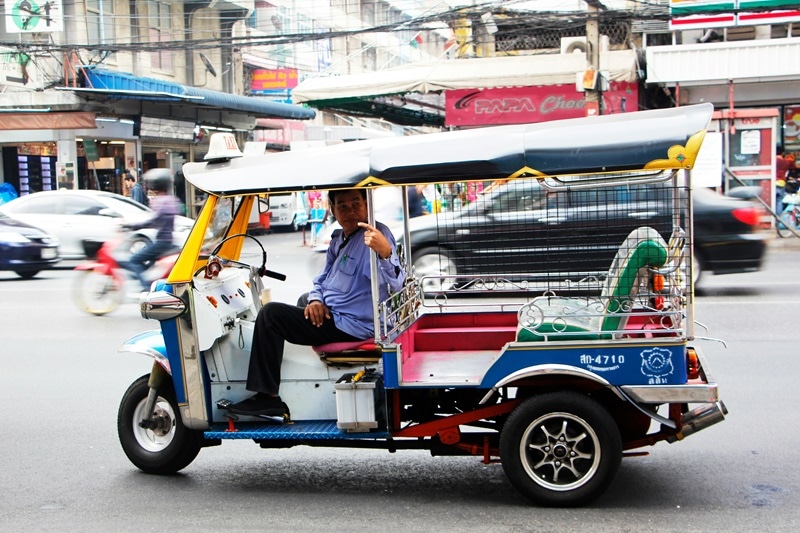
While some drivers are reasonable if you have a chat with them about the price, especially if you can chuck in a few Thai words to show that you are cool, unlike all those other backpackers. You might be able to get a very short ride for 100 baht, but more likely it will be 200 baht. Annoyingly, many would rather wait and take advantage of the next guy.
The Tuk Tuk Tour Scam
Tuk tuk drivers convince tourists to take an extended tour of the city. These tours come with a ludicrously low fee of something like 200 baht for the whole day. That should be the first hint that this is too good to be true.
Promising to show you hidden gems, these tours just lead to overpriced souvenir shops, jewelry stores, and tailors where high-pressure sales tactics can feel very threatening, and drivers receive a commission for every purchase.
Avoid the Scam
If you really want the experience (and instagram photos) of riding a tuk tuk in Bangkok, then start by approaching one who is not yelling at you and following you down the street.
Have a firm destination in mind and practice saying the name in Thai so that you don’t sound too naive. For example, Siam in Thai is not pronounced “sigh am” it’s more like “see um” – Siam Paragon is pronounced “see-um pah-rah-gone”. Break up the syllables. You can use Google Translate to practice your pronunciation.
Have a firm price and make sure to reiterate it a few times. 200 baht is a pretty average farang price for anywhere within about 4 km – though good negotiators might be able to get a ride for as low as 50 baht.
If you annoy the driver too much, he might take you to your destination and then tell you the price you negotiated was the per-person price. This is a lie and a weak attempt at scamming. He will likely give up if you call him on it, hand over the agreed upon money and walk away.
Gem Shops
Thailand is famous for its gem markets, offering a variety of precious stones such as rubies, sapphires, and emeralds. However, not all gem shops operate with integrity, and tourists have a huge target on their back when they visit these markets.

The Gem Scam
A friendly local approaches you based on your elephant pants and the Nikon camera hanging around your neck. They might pose as a helpful guide, a driver, or even a fellow tourist.
The conversation will be light and engaging and they won’t immediately get to the point, but eventually they will have recommendations for a particular gem shop. They will claim to have insider information about secret and timely discounts.
Tourists are then lured to the suggested gem shop before they even realize what is going on. The gems are either low quality or downright fake and way overpriced. The sales tactics are well-practiced and they will not let you go till you buy something.
Avoid the Scam
They count on several factors for this scam to work including confusion about currency conversion rates, cluelessness about how to spot quality gems, and people wanting to avoid confrontation and not wanting to cause a scene or insult locals.
If you actually want to shop for gems or gold while in Thailand, research reputable dealers, look for longevity and genuine reviews on Google. If a deal seems too good to be true, it probably is, so compare prices across different shops and markets and ask for certification or documentation verifying the authenticity and quality of the gem.
Most of all, be wary of unsolicited recommendations from strangers, especially those offering special deals or claiming to have insider knowledge. Do not be afraid to be firm, stand your ground, and refuse to be bullied into a purchase.
The Grand Palace
One of Thailand’s most iconic landmarks and a significant tourist attraction, everyone in Thailand should go at least once and see the Temple of the Emerald Buddha. It is open from 8:30 am to 3.30 pm daily and tickets are 500 baht for foreigners and free for Thai nationals – But this is not the scam we are going to talk about today.
The Grand Palace Scam
Scammers often target the Grand Palace in Bangkok and other popular attractions by approaching tourists near the entrance. They might be well-dressed and seem legit when they confidently inform you that the Grand Palace is closed for a religious ceremony or Thai holiday.

They will then offer an alternative tour to some local attractions nearby. They will conveniently have a tuk tuk or taxi waiting right there with a driver ready to take you to on a day of fun. Instead of temples and floating markets and all that other good stuff, you have just trapped yourself right into a combination of the tuk tuk scam and the gem scam.
Get ready for a day of dodgy jewelry shops, overpriced tailors, mass-produced art presented as the work of struggling local artists, and other contrived scenarios designed to tug at your heart – and purse – strings.
Avoid the Scam
Sorry to say this, but when you are near a major tourist attraction, ignore everyone who tries to talk to you. Keep your eyes straight ahead, politely decline conversation, walk with conviction, know where the ticket offices are in advance, and check opening hours on Google Maps.
No legit offers are coming from strangers who speak English outside of the Grand Palace.
Jet Skis in Thailand
Hourly rates for jet ski rentals in Thailand range from 800 to 1,500 baht per hour. It’s a popular choice for thrill-seekers and Thai beaches are perfect for the sport – flat, calm, and lacking in predators. However, amidst the leather-skinned retirees and turquoise waters, a different kind of predator is lurking – the jet ski vendor.
The Jet Ski Scam
These are prevalent in popular beach destinations like Phuket and Pattaya. Strolling along the beach, you will eventually come across a local on a deck chair with a sandwich board listing prices for water sport good times. They may even approach you unsolicited.
The prices are reasonable, so you go for it. YOLO.
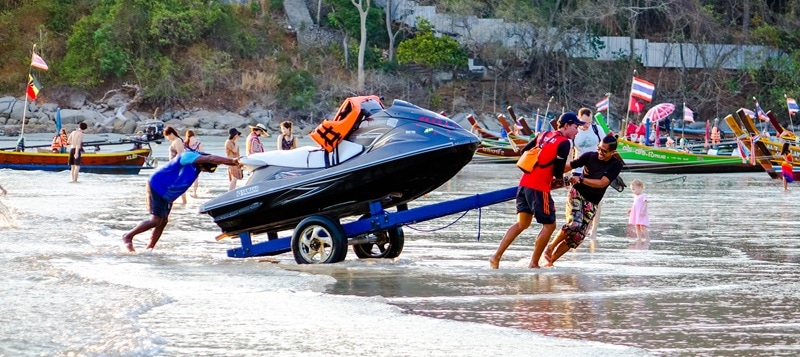
After your hour of hooning around on your aqua motorcycle, you return and they inspect the jet ski and claim to find scratches or damage that was supposedly not there before. They then demand exorbitant fees for repairs.
The situation can escalate quickly. Intimidation tactics are not unheard of – guns might even be flashed – and tourists have found themselves coerced into paying hefty sums to avoid confrontations.
Avoid the Scam
Honestly, most long-term Thailand residents just avoid the drama and steer clear of renting jet skis. But if you really want the thrill – and I can personally confirm they are SO FUN – there are some things you can do to minimize risk.
Before hopping on a jet ski, thoroughly inspect it for any pre-existing damage. Take pictures or a video to have evidence in case any disputes arise later.
The key is NEVER to rely on the photos they take themselves, even if they do it in front of you. They have photoshopped photos ready in their phone with the damage and scratches digitally removed. It’s 2023, photo editing takes but a few minutes.
Clearly discuss rental terms, including the duration, fuel policy, and any potential additional charges. Get everything in writing if possible.
Opt for well-established and reputable jet ski rental shops. Ask for recommendations from your hotel and avoid renting from individuals who approach you on the beach.
Corrupt & Phony Cops
We tend to trust a person in uniform. We are programmed to do what they tell us and in Thailand, you might not be able to tell the difference between various uniforms or an official looking outfit with no authority at all.
The Police Scam
You will be exploring a touristy place, or walking down Sukhumvit Road near Asoke when someone claiming to be a tourist police officer approaches you with an air of authority.
They may be donned in uniforms that mimic official attire, complete with badges and authoritative demeanor. With a stern expression, they inform you that you’ve committed a minor offense, usually littering.
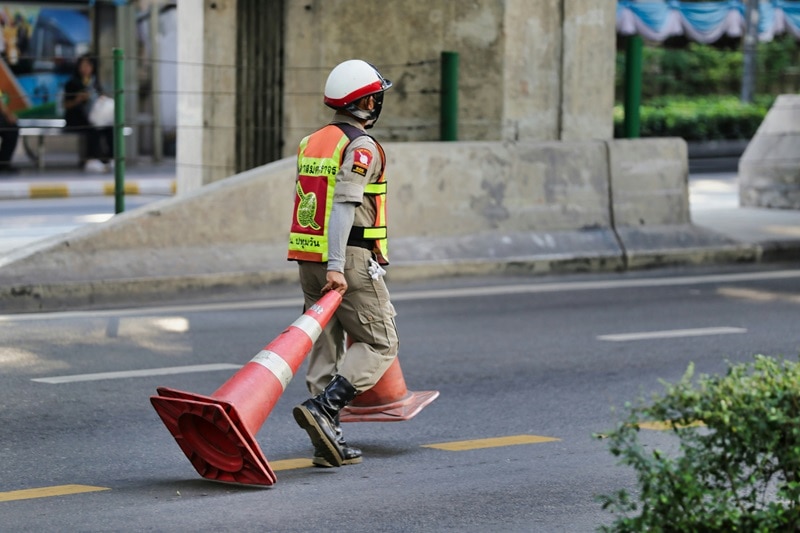
Instead of following the proper legal procedures, these officers assert that you can settle the matter immediately by paying a so-called “fine” directly to them, conveniently sidestepping the need for official paperwork and avoiding a trip to the station.
Without making any bold statements, these might actually be real police, or they might not. You might even be guilty of littering, riding a motorcycle without a helmet (don’t do this), or smoking where you shouldn’t be.
No matter what, someone asking you for cash for an on-the-spot fine is always the incorrect procedure.
Avoid the Scam
Authentic police officers will always carry proper identification. Don’t hesitate to ask for their ID and ask which station they are from. This might be enough to scare them off.
If you are genuinely in violation of any rules, insist on receiving an official ticket. You never have to go to the police station to pay the fine immediately, fines can be paid at your convenience when you present the ticket at the police station which governs the area. Fines for small infractions are generally 300 baht and rarely more than 500 baht.
Familiarize yourself with local laws and regulations to distinguish between legitimate charges and scams. Remain calm but assertive. Politely insist on following proper procedures and never hand over cash.
Report any encounters with fake police or instances of corruption to the local authorities.
Thailand Taxis
Abundant, affordable, and comfortable – hailing a Bangkok taxi, or a cab somewhere else in Thailand (angrily looking at you, Phuket) can seem like a normal, easy thing to do, but things can go wrong.
The Taxi Scams
A seemingly friendly driver will beckon you into their cab and ask where you are going through the front window. Here is your first red flag. Negotiating through the window usually means the driver wants to go off-meter, or they are picking-and-choosing their fares.
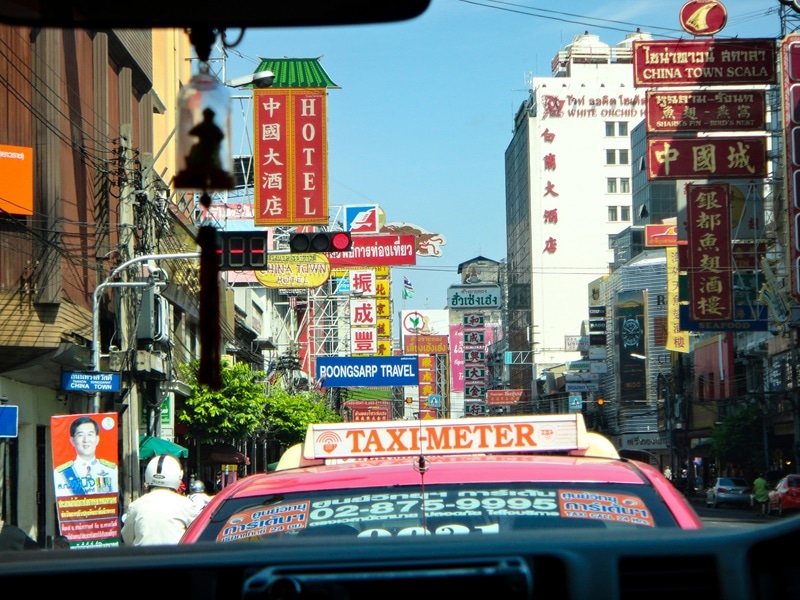
Drivers are actually not allowed to decline rides and can be fined up to 5,000 baht for this practice. For many of us locals, if the back door is locked, we simply walk away from the cab and refuse to talk through the window.
Off-meter prices are wildly unpredictable and never a good idea for visitors to attempt. If they tell you the meter is broken, it’s a scam.
Illegally manipulated meters is another tactic. They have been tampered with to rack up those baht at a wildly rapid rate. You think you are getting the legit price, only to later learn that your taxi from the airport should have been closer to 300 baht than 3,000.
General scaminess happens when drivers take ridiculous routes around the city to inflate the fare. Taxi drivers can also pull the tuk tuk scam listed above.
Oh, and they can take your thousand baht note, hold it for a second, then return it to you claiming it is fake, when actually they have just swapped it for a fake one, keeping your real note.
Seen any other taxi scams in Thailand? Let us know in the comments and we will update the article.
Avoid the Scam
To safeguard yourself from falling victim to taxi scams in Thailand, you should start by only using official and licensed taxis, avoid ANYONE approaching you at the airport or tourist destinations yelling “hello taxi?”
Always insist that the taxi driver uses the meter. If they claim it’s broken… byeeeee.
Familiarize yourself with typical taxi fares in the area to know if someone is trying to rip you off. Carry small denominations of local currency to prevent drivers from claiming they don’t have change.
Use Grab, Bolt, or InDrive ride-hailing apps whenever possible. This way you know the fare, you have your driver’s info, you have the route mapped out, and you have a record of the trip.
Learn more:
- Transportation in Bangkok: A Guide to Taxis, Buses, Trains, and Mobile Apps
- A Guide to Preparing for a Trip and Spending Your Vacation in Thailand
There You Have It
I know this all feels really negative and people might assume I have a chip on my shoulder thinking people are out to rip me off, but that is not the case. Living here, we just have to keep these things in mind. We do not walk around angry and suspicious all day.
In general, Thailand is less scammy than many other major cities around the world. You will likely be just fine.
I just hope that by sharing this information, I can help some people be less susceptible to being taken advantage of. I genuinely don’t want people to leave Thailand feeling like they were victims. I want you to love Thailand as much as I do!
Share Your Scam Stories
Have you ever been scammed in Thailand before?
Whether it’s a taxi scam, a tuk-tuk scam, or any other type of scam, we want to hear about it! Your experiences can help us keep our article up to date. By telling us your story, you can also help others avoid the same pitfalls.
You can do so in the comments below.
Disclaimer: This article is an opinion editorial (op-ed) and represents the views of the author. The opinions expressed herein are solely those of the author and do not necessarily reflect the opinions or views of ExpatDen. Readers are encouraged to consider diverse perspectives and form their own opinions.



